
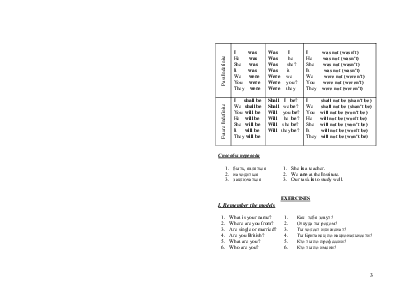
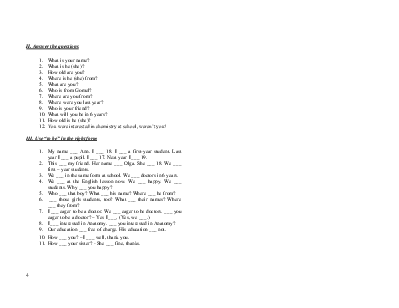
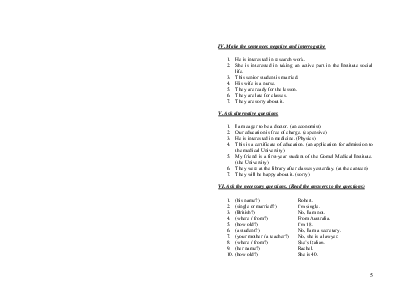
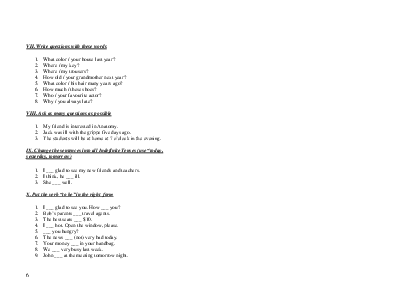
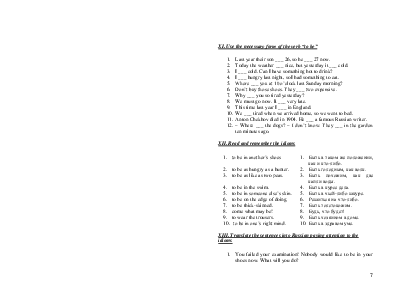
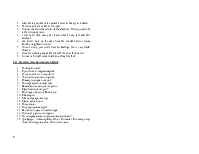
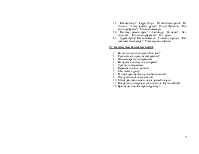
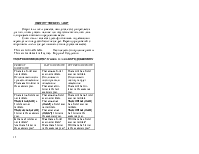
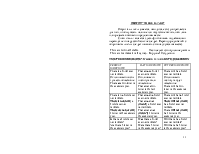
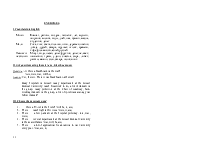
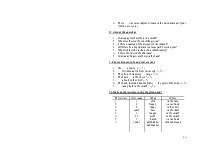
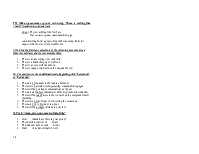
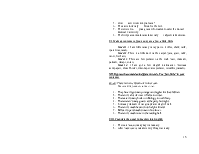
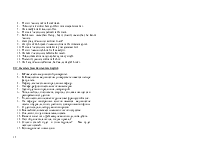
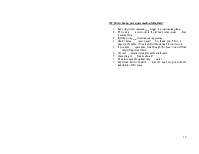
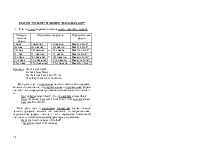
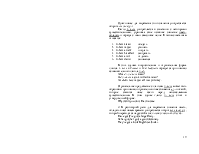
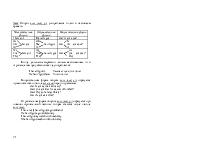
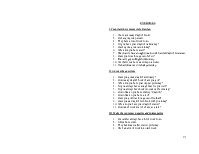
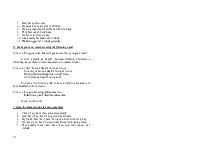
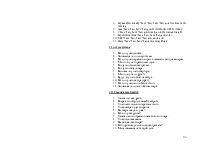
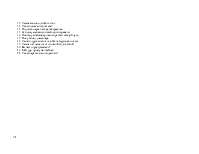
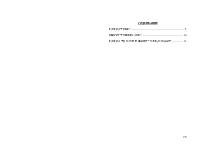
ГЛАГОЛ “TO BE”
Использование глагола
Глагол “to be” используется в качестве глагола-связки в составном именном сказуемом, соответствуя в русском языке глаголам «быть, являться, находиться». В отличие от русского языка глагол-связка никогда не опускается. Именная часть может быть выражена:
a) Существительным
We are students. – Мы – студенты.
b) Прилагательным
She is happy. – Она счастлива.
c) Числительным
He is twenty. – Ему 20 лет.
|
Утвердительная форма |
Вопросительная форма |
Отрицательнаяформа |
|
|
Present Indefinite |
I am You are He is She is It is We are You are They are |
Am I? Are you? Is he? Is she? Is it? Are we? Are you? Are they? |
I am not You are not (aren’t) He is not (isn’t) She is not (isn’t) It is not (isn’t) We are not (aren’t) You are not (aren’t) They are not (aren’t) |
|
Past Indefinite |
I was He was She was It was We were You were They were |
Was I Was he Was she? Was it Were we Were you ? Were they |
I was not (wasn’t) He was not (wasn’t) She was not (wasn’t) It was not (wasn’t) We were not (weren’t) You were not (weren’t) They were not (weren’t) |
|
Future Indefinite |
I shall be We shall be You will be He will be She will be It will beThey will be |
Shall I be? Shall we be? Will you be? Will he be? Will she be? Will they be? |
I shall not be (shan’t be) We shall not be (shan’t be) You will not be (won’t be) He will not be (won’t be) She will not be (won’t be) It will not be (won’t be)They will not be (won’t be) |
|
1. быть, являться 2. находиться 3. заключаться |
1. She is a teacher. 2. We are at the Institute. 3. Our task is to study well. |
EXERCISES
I. Remember the models
|
1. What is your name? 2. Where are you from? 3. Are single or married? 4. Are you British? 5. What are you? 6. Who are you? |
1. Как тебя зовут? 2. Откуда ты родом? 3. Ты холост или женат? 4. Ты Британец по национальности? 5. Кто ты по профессии? 6. Кто ты по имени? |
|
1. What is your name? 2. What is he (she)?3. How old are you? 4. Where is he (she) from? 5. What are you? 6. Who is from Gomel? 7. Where are you from? 8. Where were you last year? 9. Who is your friend? 10. What will you be in 6 years? 11. How old is he (she)? 12. You were interested in chemistry at school, weren’t you? |
|
1. My name ___ Ann. I ___ 18. I ___ a first-year student. Last year I ___ a pupil. I ___ 17. Next year I ___ 19. |
|
2. This ___ my friend. Her name ___ Olga. She ___ 18. We ___ first – year students. 3. We ___ in the same form at school. We ___ doctors in 6 years. |
|
4. We ___ at the English lesson now. We ___ happy. We ___ students. Why ___ you happy? |
|
5. Who ___ that boy? What ___ his name? Where ___ he from? |
|
6. ___ those girls students, too? What ___ their names? Where ___ they from? |
|
7. I ___ eager to be a doctor. We ___ eager to be doctors. ___ you eager to be a doctor? – Yes I ___. (Yes, we ___.) |
|
8. I ___ interested in Anatomy. ___ you interested in Anatomy? |
|
9. Our education ___ free of charge. His education ___ not. |
|
10. How ___ you? – I ___ well, thank you. |
|
11. How ___ your sister? - She ___ fine, thanks. |
1. He is interested in research work.
2. She is interested in taking an active part in the Institute social life.
3. This senior student is married.
4. His wife is a nurse.
5. They are ready for the lesson.
6. They are late for classes.
7. They are sorry about it.
1. I am eager to be a doctor. (an economist)
2. Our education is free of charge. (expensive)
3. He is interested in medicine. (Physics)
4. This is a certificate of education. (an application for admission to the medical University)
5. My friend is a first-year student of the Gomel Medical Institute. (the University)
6. They were at the library after classes yesterday. (at the canteen)
7. They will be happy about it. (sorry)
|
1. (his name?) 2. (single or married?) 3. (British?) 4. (where / from?) 5. (how old?) 6. (a student?) 7. (your mother / a teacher?) 8. (where / from?) 9. (her name?) 10. (how old?) |
Robert. I’m single. No, I am not. From Australia. I’m 18. No, I am a secretary. No, she is a lawyer. She’s Italian. Rachel. She is 40. |
1. What color / your house last year?
2. Where / my key?
3. Where / my trousers?
4. How old / your grandmother next year?
5. What color / his hair many years ago?
6. How much / these shoes?
7. Who / your favourite actor?
8. Why / you always late?
1. My friend is interested in Anatomy.
2. Jack was ill with the grippe five days ago.
3. The students will be at home at 7 o’clock in the evening.
1. I ___ glad to see my new friends and teachers.
2. I think, he ___ ill.
3. She ___ well.
1. I ___ glad to see you. How ___ you?
1. Last year their son ___ 26, so he ___ 27 now.
2. Today the weather ___ nice, but yesterday it ___ cold.
3. I ___ cold. Can I have something hot to drink?
4. I ___ hungry last night, so I had something to eat.
5. Where ___ you at 10 o’clock last Sunday morning?
6. Don’t buy those shoes. They ___ two expensive.
7. Why ___ you so tired yesterday?
8. We must go now. It ___ very late.
9. This time last year I ___ in England.
10. We ___ tired when we arrived home, so we went to bed.
11. Anton Chekhov died in 1904. He ___ a famous Russian writer.
12. – Where ___ the dogs? – I don’t know. They ___ in the garden ten minutes ago.
|
1. to be in another’s shoes 2. to be as hungry as a hunter. 3. to be as like as two peas. 4. to be in the swim. 5. to be in someone else’s skin. 6. to be on the edge of doing. 7. to be thick-skinned. 8. come what may be! 9. to wear the trousers. 10. to be in one’s right mind. |
1. Быть в таком же положении, как и кто-либо. 2. Быть голодным, как волк. 3. Быть похожим, как две капли воды. 4. Быть в курсе дела. 5. Быть в чьей-либо шкуре. 6. Решиться на что-либо. 7. Быть толстокожим. 8. Будь, что будет! 9. Быть хозяином в доме. 10. Быть в здравом уме. |
1. You failed your examination! Nobody would like to be in your shoes now. What will you do?
2. After having worked in the garden he was as hungry as a hunter.
3. The twin girls are as like as two peas.
4. You do not know the results of the elections. Then you can’t be in the swim any more.
5. I was in his skin once and I know what he can feel after this accident.
6. His nerves were on the edge from the constant noise coming from his neighbour’s room.
7. Do not worry, you won’t hurt his feelings. He is very thick-skinned.
8. From her wedding day until her death she wore the trousers.
9. No one in his right mind would do a thing like that!
1. Твой брат дома?
2. Где они были вчера вечером?
3. Сколько стоят эти открытки?
4. Эта гостиница очень дорогая.
5. Почему ты вчера опоздал?
6. Я интересуюсь искусством.
7. Все магазины сегодня открыты.
8. Музей сегодня открыт?
9. Его вчера не было в Институте.
10. Мне жарко.
11. Моя сестра архитектор.
12. Меня там не было.
13. Я не устала.
14. Откуда родом её муж?
15. Её не было дома в 5 часов вчера.
16. Они не студенты, они врачи.
17. Ты интересуешься иностранными языками?
18. Дик Браун – инженер. Ему 30 лет. Он женат. Его жену зовут Анна. Они журналистка. Они из Лондона.
19. – Как вас зовут? – Гарри Стоун. – Из какой вы страны? – Из Англии. – А откуда ваши друзья? – Они из Франции. – Кто вы по профессии? – Мы все инженеры.
20. – Как зовут вашего брата? – Александр. – Он женат? – Нет, он холост. – Кто он по профессии? – Он – врач.
21. – Здравствуйте! Как поживаете? – Спасибо, хорошо. – Как поживает твоя сестра? – Тоже хорошо, спасибо.
1. Вы были больны на прошлой неделе?
2. Где вы были в прошлое воскресенье?
3. Фильм вчера был интересным.
4. Вы будете в институте в это время?
5. Урок был интересным.
6. Перемена была не длинной.
7. Мы готовы к уроку.
8. Кто ваш преподаватель английского языка?
9. Я буду свободна после занятий.
10. Мы будем очень заняты на следующей неделе.
11. Вчера книги и журналы были на столе. Где они сейчас?
12. Врач будет в палате через пару минут.
ОБОРОТ “THERE IS / ARE”
Оборот thereis/are(имеется, находится, есть) употребляется для того, чтобы указать наличие или отсутствие какого-либо лица или предмета в каком-то определенном месте.
Слово «there» является здесь «фиктивным» подлежащим и переводить его на русский язык не следует. Перевод предложений с оборотом thereis/are следует начинать с конца (с указания места).
|
There are tests on the table. There are ten students in the group. |
На столе (есть) контрольные работы. В группе 10 студентов. |
УПОТРЕБЛЕНИЕ ОБОРОТА THEREIS / ARE В ПРЕДЛОЖЕНИЯХ
|
PRESENT INDEFINITE |
PAST INDEFINITE |
FUTURE INDEFINITE |
|
There is a hostel near our Institute. Около нашего института есть общежитие. There are two terms in the academic year. |
There was a hostel near our Institute. Около нашего института было общежитие. There were two terms in the last academic year. |
There will be a hostel near our Institute. Около нашего института будет общежитие. There will be two terms in the academic year. |
|
There is no hostel near our Institute. There is not (isn’t) a hostel near our Institute. There are not (aren’t) 3 terms in the academic year. |
There was no hostel near our Institute. There was not (wasn’t) a hostel near our Institute. There were not (weren’t) 3 terms in the academic year. |
There will be no hostel near our Institute. There will not (won’t) be a hostel near our Institute. There will not (won’t) be 3 terms in the academic year. |
|
Is there a hostel near our Institute? Are there 2 terms in the academic year? |
Was there a hostel near our Institute? Were there 2 terms in the academic year? |
Will there be a hostel near our Institute? Will there be 2 terms in the academic year? |
ОБОРОТ “THERE IS / ARE”
Оборот thereis/are(имеется, находится, есть) употребляется для того, чтобы указать наличие или отсутствие какого-либо лица или предмета в каком-то определенном месте.
Слово «there» является здесь «фиктивным» подлежащим и переводить его на русский язык не следует. Перевод предложений с оборотом thereis/are следует начинать с конца (с указания места).
|
There are tests on the table. There are ten students in the group. |
На столе (есть) контрольные работы. В группе 10 студентов. |
УПОТРЕБЛЕНИЕ ОБОРОТА THEREIS / ARE В ПРЕДЛОЖЕНИЯХ
|
PRESENT INDEFINITE |
PAST INDEFINITE |
FUTURE INDEFINITE |
|
There is a hostel near our Institute. Около нашего института есть общежитие. There are two terms in the academic year. |
There was a hostel near our Institute. Около нашего института было общежитие. There were two terms in the last academic year. |
There will be a hostel near our Institute. Около нашего института будет общежитие. There will be two terms in the academic year. |
|
There is no hostel near our Institute. There is not (isn’t) a hostel near our Institute. There are not (aren’t) 3 terms in the academic year. |
There was no hostel near our Institute. There was not (wasn’t) a hostel near our Institute. There were not (weren’t) 3 terms in the academic year. |
There will be no hostel near our Institute. There will not (won’t) be a hostel near our Institute. There will not (won’t) be 3 terms in the academic year. |
|
Is there a hostel near our Institute? Are there 2 terms in the academic year? |
Was there a hostel near our Institute? Were there 2 terms in the academic year? |
Will there be a hostel near our Institute? Will there be 2 terms in the academic year? |
EXERCISES
I. Translate into English
|
Много |
Комнат, работы, воздуха, таблеток, лет, музыки, шприцов, молока, воды, дней, чая, бумаги, масла, студентов, денег |
|
Мало |
Сока, книг, света, больниц, окон, деревьев, цветов, дождя, друзей, сахара, игрушек, иголок, времени, кофе, фильмов, болезней, рублей |
|
Немного / несколько |
Минут, воды, песен, денег, фруктов, денег, человек, пациентов, травы, удачи, счастья, сыра, ложек, работы, машин, соли, сахара, поликлиник. |
II. Ask questions using there is / are . Give the answers
Question: - Is there a blackboard on the wall?
(Are, were, was, will be)
Answer: Yes, there is. There is one blackboard on the wall
Many hospitals in Gomel; many departments at the Gomel Medical University; much homework to do, a lot of students in the group; many professors at the Chair of Anatomy, hard-working students in the group, a lot of sportsmen among your fellow students?
III. Choose the necessary word
1. ___ there a TV-set in the hostel? (will be, is, are)
2. There ___ much light in this room (were, is, am)
3. There __ a few patients at the hospital yesterday. (are, was, were)
4. There ___ several departments at the Gomel Medical University in the nearest future (was, will, be, are)
5. There ___ a lot of applications for admission to our University every year. (was, are, is)
6. There ___ one more subject to learn in the curriculum next year. (will be, are, were)
IV. Answer the questions
1. How many teeth are there in a mouth?
2. What was there in the consulting room?
3. Is there a canteen at the disposal of our students?
4. Will there be a big stadium or a large park here in a year?
5. What will there be instead of an old laboratory?
6. Is there the liver in the abdomen?
7. How many fingers are there on the hand?
V. Choose between to be and there is / are
1. She ___ a doctor. (+, -, ?)
2. ___ two Medical Schools in our city. (-, ?)
3. The Chair of Anatomy ___ large. (-, ?)
4. The heart ___ in the chest. (+, ?)
5. ___ a heart in the chest (+, ?)
6. The head, the trunk and the limbs ___ the parts of the body. (+, ?)
7. ___ many teeth in the mouth. (+, ?)
VI. Make up the sentences using the given words
|
There is/are |
How many |
What |
Where |
|
1. ___ 2. ___ 3. ___ 4. ___ 5. ___ 6. ___ 7. ___ 8. ___ |
1 4 2 much 1 32 1 1 and 1 |
chin fingers lungs hair tongue teeth thumb gall-bladder and bladder |
on the face on one hand in the chest on the skull in the mouth in the mouth on one hand in the abdomen |
VII. Make up sentences of your own using “There is nothing like +noun” (нетничеголучше, чем)
Model: There is nothing like fresh air.
Нет ничего лучше, чем свежий воздух.
An interesting book; a glass of tea in the morning; fruits for supper; cold shower; frosty weather; etc.
VIII. Find the Russian equivalents of the following proverbs. Read them several times and try to remember them.
1. There is no use crying over spilt milk.
2. There is a black sheep in every flock.
3. There is no rose without a thorn.
4. There is many a slip between the cup and the lip.
IX. Put questions to the underlined words, beginning with “how much” or “how many”
1. There are 45 students in the reading hall now.
2. There were 3 articles in the yesterday’s medical newspaper.
3. There will be 4 entrance examinations next year.
4. There are only a few laboratories at the disposal of our students.
5. There will be much noise in the room when the equipment starts operating.
6. There were a lot of ways of expressing the same idea.
7. There are 365 or 366 days in a year.
8. There will be a single mistake in your test.
X. Put in “many, few, a few, much, a little, little”
1. How ___ students are there in your group?
2. The skeleton consists of ___ bones.
3. The students have to read ___ books.
4. Only ___ of us know English well.
5. How ___ new words did you learn?
6. The nurse took only ___ blood for the test.
7. There were too ___ young men who wanted to enter the Gomel
Уважаемый посетитель!
Чтобы распечатать файл, скачайте его (в формате Word).
Ссылка на скачивание - внизу страницы.